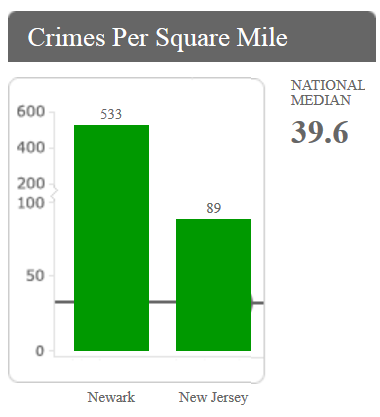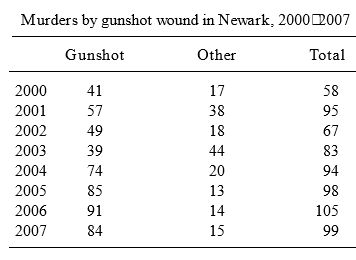Racial Profiling Saves Black Lives
In a previous article we saw that Stand-Your-Ground laws reduce the number of black victims murdered. In a similar manner, racial profiling saves black lives. Or to be more accurate, the absence of racial profiling increases crimes against blacks. Let me give you one example:
Newark today is one of the most crime-infested cities in the country (1); there are 533 crimes per square mile compared to a national average of 39.6 - almost 14 times higher. Back in 1999 the Justice department pressured New Jersey State troopers to stop racial profiling along Interstate 95 (known as the "Iron Pipeline"), a popular route for criminals smuggling firearms from the South into Newark. As a consequence, gun arrests/seizures plummeted on the Turnpike. As a further consequence, murders by gunshot in Newark, New Jersey almost doubled (2) from 2000 to 2007 despite murder rates remaining flat in the rest of the country (3).
There's more than ample evidence to suggest that racial profiling by police is the best thing for blacks in terms of reducing crime and murders against other blacks. This is not a solution to the black crime problem but it helps for now. Someday I hope the public finally realizes that we are to blame because of our policies (4).
Finally, let us stop saying that racial profiling is racist:
FrontPage Magazine, Profiling vs. Racism
few people understand or have the courage to acknowledge, namely that black and young has become synonymous with crime and, hence, suspicion. To make that connection does not make one a racist. Let’s look at it.
Twelve years ago, a black Washington, D.C., commissioner warned cabbies, most of whom were black, against picking up dangerous-looking passengers. She described “dangerous-looking” as a “young black guy … with shirttail hanging down longer than his coat, baggy pants, unlaced tennis shoes.” She also warned cabbies to stay away from low-income black neighborhoods. Did that make the D.C. commissioner a racist?
In some cities, such as St. Louis, black pizza deliverers have complained about having to deliver pizzas to certain black neighborhoods, including neighborhoods in which they live. Are they racists? The Rev. Jesse Jackson once remarked, “There is nothing more painful for me at this stage in my life than to walk down the street and hear footsteps and start thinking about robbery — (and) then look around and see somebody white and feel relieved.” Does that make the reverend a racist?
The former Charleston, S.C., black chief of police, Reuben Greenberg, said the problem facing black America is not racial profiling. He said, “The greatest problem in the black community is the tolerance for high levels of criminality.” Former Los Angeles black police Chief Bernard Parks, defending racial profiling, said: “It’s not the fault of the police when they stop minority males or put them in jail. It’s the fault of the minority males for committing the crime.
ENDNOTES
(1):
NeighborhoodScout, Newark crime rates
(2):
The National Bureau of Economic Research, Jul 2010, The Economics of Crime [PDF]
(3):
The Disaster Center, United States Crime Index Rates Per 100,000 Inhabitants
Year....Murder
2000....5.5
2001....5.6
2002....5.6
2003....5.7
2004....5.5
2005....5.6
2006....5.7
2007....5.6
(4):
Some things we can do to reduce black crime:
- Lower the minimum wage so more black teens can be hired,
- End the War on Drugs which only makes drugs so expensive that selling drugs is immensely profitable,
- Legalize drugs so that we don't put millions of black kids behind bars where they network and become more involved in gangs,
- Stop welfare which encourages women (white as well as black) to have loads of kids they can't take care of,
- Demand that Black leaders encourage black youth to emulate white culture so that they can be successful in American society,
- Stop blaming racial injustice for inner city poverty,
- Stop the War on Poverty because we lost that war,
- and most importantly: stop spending money on educating black children - we cannot help them, instead spend the money on teaching their parents how to be good parents.



